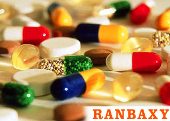 Drug major Ranbaxy Laboratories has launched its generic version of blockbuster cholesterol-lowering drug Lipitor in the US market.
Drug major Ranbaxy Laboratories has launched its generic version of blockbuster cholesterol-lowering drug Lipitor in the US market.
The launch came after final approval from the US health regulator to manufacture the generic version of Lipitor at Ranbaxy's wholly owned Ohm Laboratories facility in New Brunswick, New Jersey, as well as market the product.
"Ranbaxy Pharmaceuticals Inc, a wholly owned subsidiary of Ranbaxy Laboratories, has received final approval from the US Food and Drug Administration to manufacture and market Atorvastatin and has launched the product in the US market," the company said in a statement.
Following the news, shares of Ranbaxy Laboratories shot up by 7.52 per cent to Rs 467.50 in opening trade on the BSE on Thursday.
Commenting on the development, Ranbaxy chief executive officer and managing director Arun Sawhney said: "Atorvastatin helps millions of Americans manage healthy cholesterol levels and we are pleased to have received United States Food and Drug Administration's approval to manufacture and market a safe, effective, affordable and accessible alternative to branded Lipitor."
"We are committed to continuing to expand our portfolio of products offered in the US market for the benefit of patients, prescribers and the US healthcare system," he added.
"Pursuant to an agreement between Ranbaxy and Teva Pharmaceuticals USA, Inc, a portion of the profits from sales of Atorvastatin during Ranbaxy's 180-day first-to-file exclusivity period will be paid to Teva. Terms of the agreement will not be disclosed," the Ranbaxy statement added.
Atorvastatin is a cholesterol-reducing medicine, the generic equivalent of Pfizer's Lipitor drug, which generated total annual sales of $7.89 billion in the United States through September, 2011, Ranbaxy said.
The Gurgaon-based firm has gained approval to make generic atorvastatin calcium tablets in 10-milligram, 20-mg, 40-mg and 80-mg strengths.
"This medication is widely used by people who must manage their high cholesterol over time, so it is important to have affordable treatment options," FDA Centre for Drug Evaluation and Research director Janet Woodcock said in a statement posted on the USFDA website.
Despite having six months exclusivity to Lipitor, the company still needed final clearance from the FDA for its copy of the world's best-selling drug so that it could launch the generic version in the US.
The USFDA grants first-to-file status to a company for a product if it is the first to successfully apply and get approval to launch a generic copy of a patented drug.
US-based Watson Pharmaceuticals Inc, which has been authorised by Pfizer to sell a generic version of Lipitor, doesn't need regulatory approval and started selling the drug from November 30.
Ranbaxy and Pfizer had settled all of their litigations worldwide over the Lipitor patent in 2008.
It was, however, not clear whether Ranbaxy and the USFDA have resolved issues related to the violation of manufacturing norms at some of the company's plants in India.
Ranbaxy officials declined comment on the development.
Settling the issue with the USFDA was of immense importance to Ranbaxy as the Gurgaon-based firm has exclusive rights to the off-patent version of Lipitor, Pfizer's blockbuster cholesterol-lowering drug, which witnessed sales of over $10 billion for the year ended September, 2010.
In 2008, the USFDA had banned 30 generic drugs produced by Ranbaxy at its Dewas (Madhya Pradesh) and Paonta Sahib and Batamandi units in Himachal Pradesh, citing gross violation of approved manufacturing norms.
In the same year, the US Department of Justice had also moved a motion against the company in a local court, alleging forgery of documents and fraudulent practices.
The motion was withdrawn later.
Japanese drug-maker Daiichi Sankyo had acquired majority stake in Ranbaxy in 2008 for a total outgo of around Rs 22,000 crore (Rs 220 billion).
The company expects to launch an anti-malaria drug in India toward the end of 2011 or early 2012.







 © 2025
© 2025